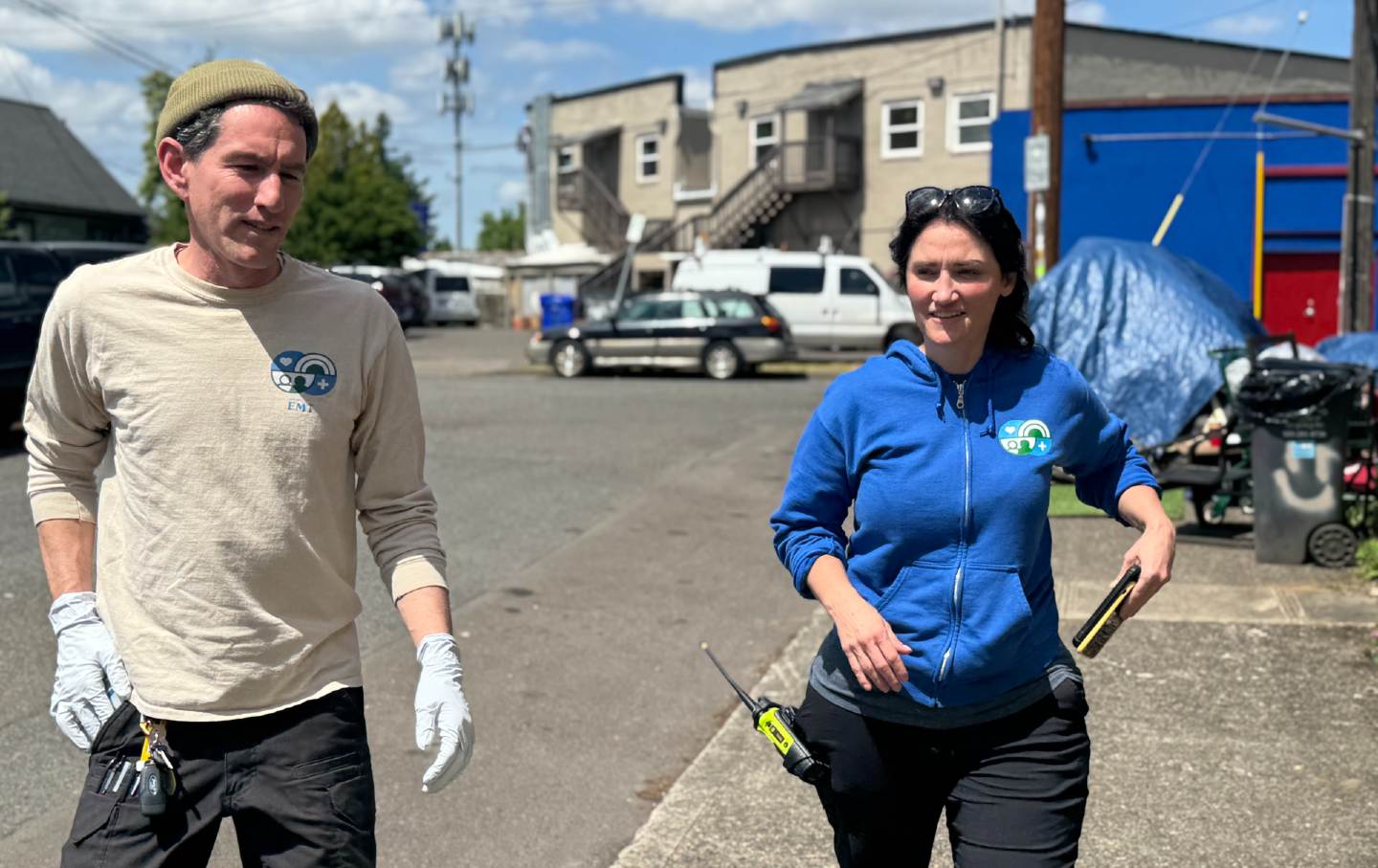The court’s ruling in Medina v. Planned Parenthood twists logic, common sense, and the law to further the right-wing assault on bodily autonomy.
A pro-choice demonstrator holds a sign in front of the US Supreme Court Building as the Medina v. Planned Parenthood South Atlantic case is heard on Wednesday, April 2, 2025.
(Tom Williams / CQ-Roll Call, Inc via Getty Images)
The Supreme Court dealt a devastating blow to women, their ability to choose their own doctor, and the entire structure of civil rights protections today. By a vote of 6–3 (which broke down along the usual partisan lines), the court ruled that women on Medicaid cannot choose their own doctor, or sue the state to defend their civil rights, unless Republican state legislators in South Carolina approve.
This case, Medina v. Planned Parenthood, is not about abortion—at least not as a legal matter. Since the passage of the Hyde Amendment back in 1976, federal funds, including Medicaid funds, cannot be used for abortion services. The Hyde Amendment is one of the worst laws we’ve ever passed, and a consistent excuse for treating women’s health care as a political chit, but this case did not challenge it. Nor did it seek to overturn the Republican court’s neolithic stance on abortion rights.
But this case is all about abortion as a political matter. That’s because, in 2018, South Carolina passed a law saying that Medicaid funds could not be used with any provider that also provides abortion services, even if the patient isn’t seeking an abortion.
Planned Parenthood provides a lot of medical services to people that have nothing to do with abortion. It is a critical health care provider to poor women, who are much more likely to be on Medicaid. South Carolina’s law was a direct attack on Planned Parenthood for its abortion services, but also an attack on poor women who need healthcare whose only crime is being poor.
The plaintiff in this case, Julie Edwards, went to Planned Parenthood for general gynecological services. Edwards is a diabetic and has increased risks for pregnancy. She claimed that Planned Parenthood not only provided the care she needed, but did so in a “judgment-free” environment… which I imagine can be pretty hard to find in South Carolina. She sued the state over its anti–Planned Parenthood law, accusing South Carolina of violating her civil rights under Section 1983 of the 1871 Civil Rights Act.
In truth, Edwards didn’t even need to give a reason for why she preferred Planned Parenthood doctors, because the 1965 Medicaid Act includes a freedom-of-choice provision right in its text. If states accept Medicaid funds, they must also “provide that…any individual eligible for medical assistance (including drugs) may obtain such assistance from any institution, agency, community pharmacy, or person, qualified to perform the service or services required.”
Current Issue

Read that language closely. It doesn’t say “any institution, except for Planned Parenthood” or “only institutions that Jesus agrees with.” It’s a blanket rule that ensures freedom of choice to Medicaid recipients.
At least it did until the Supreme Court took it away today. Justice Neil Gorsuch, writing for the 6–3 Republican supermajority, ruled that the statute I just quoted was not “clear” or “unambiguous” enough to support a private right to sue when freedom of choice is violated. He wrote that the language in the Medicaid statute guaranteeing freedom of choice doesn’t actually create an “enforceable right” to a freedom of choice. He said that if Congress wanted to create a right to choose your own doctor, it could have, but somehow it didn’t, even though Congress literally says that people can get medical care from “any” institution qualified to perform the services.
When people accuse the Republicans on the Supreme Court of making things up as they go along to justify their own personal policy preferences, this is what they mean. There is no commonsense read of the Medicaid statute that doesn’t include freedom of choice. There is no legal analysis of the statute that doesn’t include freedom of choice. There is no history of precedent interpreting the Medicaid statute that doesn’t include freedom of choice. There is just no way to explain what the conservatives are doing here other than servicing their own political agenda in a way that is detached from any logical or reasonable reading of the law and text of the statute.
That political agenda is, again, not just about abortion, and not just about the Republicans’ ongoing war against women’s health. The agenda also involves the continued evisceration of the Civil Rights Act of 1871, and the denuding of the Reconstruction Amendments in this court’s quest to reset this country to antebellum times.
The 1871 version of the Civil Rights Act still serves a critical function in modern law because it includes the private right to sue. Section 1983 of the law is the thing that lets people sue over discrimination. Without it, there’s no ability for individual citizens to hold the government accountable for violations of civil rights.
Predictably, the Republicans on the court are hell-bent on getting rid of Section 1983, or whittling it down until it protects nothing. In Medina, Gorsuch takes a giant step toward doing just that. The legal upshot of his ruling is that Congress cannot create a right to sue under Section 1983 unless it uses “clear” and “unambiguous” language. And even if it does, as it did in the Medicaid Act, Gorsuch can just deny the obvious clarity of that language and ban it anyway. The result is that only Neil Gorsuch (and his Republican friends) can tell what’s “clear” and what’s not, and Gorsuch here proves that he’s able to insert faux-ambiguity into any statute he doesn’t like.
Popular
“swipe left below to view more authors”Swipe →
This repudiation of civil rights is what Justice Kentaji Brown Jackson zeroed in on in her dissent. She wrote: “[T]he project of stymying one of the country’s great civil rights laws continues.… South Carolina asks us to hollow out [Section 1983] so that the State can evade liability for violating the rights of its Medicaid recipients to choose their own doctors. The Court abides South Carolina’s request. I would not.”
It’s been three years since the court overturned Roe v. Wade in Dobbs v. Jackson Women’s Health, but the conservatives are still using abortion as the Trojan Horse to smuggle in all of their worst ideas about reshaping the country in their white male image. Here, in a case that isn’t even about abortion, the Republican justices have managed to take away freedom of medical choice for poor women, limit the effectiveness of Medicaid, and eviscerate the private right to sue over issues of discrimination and civil rights. They’ve done it all because South Carolina passed a law targeted at Planned Parenthood, a law that should have been ruled facially unconstitutional in the pre-Dobbs environment when it was passed. And, almost as an externality to their dread aims, they’ve managed to dissuade any medical institution, hospital, or clinic, from providing abortion services, lest they too be kicked off of Medicaid.
This case is a terrible and perfect example of why taking back control of the Supreme Court must be the first priority for Democrats should they ever be allowed to wield power again. Civil rights in this country cannot survive the loss of the Civil Rights Act. Women’s rights in this country cannot survive Neil Gorsuch’s magic abilities to insert ambiguity into any statute that doesn’t involve Native Americans. And abortion rights, “restored” or otherwise… straight up cannot survive any Republican power on the Supreme Court.
If you’re a straight white man, congratulations. If you’re anybody else, this Supreme Court has it in for you.
Every day, The Nation exposes the administration’s unchecked and reckless abuses of power through clear-eyed, uncompromising independent journalism—the kind of journalism that holds the powerful to account and helps build alternatives to the world we live in now.
We have just the right people to confront this moment. Speaking on Democracy Now!, Nation DC Bureau chief Chris Lehmann translated the complex terms of the budget bill into the plain truth, describing it as “the single largest upward redistribution of wealth effectuated by any piece of legislation in our history.” In the pages of the June print issue and on The Nation Podcast, Jacob Silverman dove deep into how crypto has captured American campaign finance, revealing that it was the top donor in the 2024 elections as an industry and won nearly every race it supported.
This is all in addition to The Nation’s exceptional coverage of matters of war and peace, the courts, reproductive justice, climate, immigration, healthcare, and much more.
Our 160-year history of sounding the alarm on presidential overreach and the persecution of dissent has prepared us for this moment. 2025 marks a new chapter in this history, and we need you to be part of it.
We’re aiming to raise $20,000 during our June Fundraising Campaign to fund our change-making reporting and analysis. Stand for bold, independent journalism and donate to support The Nation today.
Onward,
Katrina vanden Heuvel
Publisher, The Nation
More from The Nation

Fifty-four years ago, Katharine Graham defended The Washington Post against presidential threats. Her granddaughter now fears its soul is being sold.
Pamela Alma Weymouth

The Hollow Half is not simply a memoir of personal recovery or an account of Palestinian political history. It’s an exploration of fragmentation.
Q&A
/
Lara-Nour Walton

With a new GOP majority, the incoming FCC boss aims to punish criticism, reward obedience—and screw the public.
Sam Gustin

A new Hulu-produced series by the podcast superstar documents years of sexual harassment and institutional cover-up within Boston University’s athletics department.
Ray Epstein

Deporting people to countries where they might be tortured or killed? All good, according to the six GOP justices.
Elie Mystal

In Eugene, Oregon, CAHOOTS, a decades-old crisis-response program, may disappear, but the programs it inspired have spread across the United States, including to nearby Portland.
Kaia Sand





